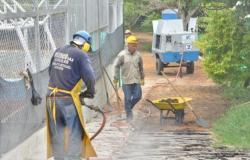· On May 18, in front of more than 500 leaders, neighbors, Carla Meyer was ratified as the candidate to continue the project of the Citizen Mayor’s Office in the Municipality of Valparaíso.
That same week, the current mayor of Buenos Aires, Jorge Sharp, announced his decision not to run for his third term, stating that he would keep “his promise,” explaining that politics “is not to be tied down or served, but to serve.”
Thus, Carla Meyer is in the initial process of collecting signatures for the registration of her candidacy, ensuring that they will soon be able to provide news about the campaign process to lead the third term of the Citizen Mayor’s Office.
Meyer spoke with Diario La Quinta about his candidacy, the challenges of the Puerto City and the decision not to participate in the elections. official primariesbecause “the political parties directly responsible for the orchestrated disorder that the Municipality and the city experienced for many years” participate.
“Whoever wins the primaries opens the door to the possibility that the old politics returns to the Municipality, and I would never be part of something that would harm Valparaíso,” he points out.
What did you think of Mayor Sharp’s decision not to seek re-election, even though the law allowed him to do so?
Good, because the word is kept and that is fundamental in politics. Mayor Sharp, during the previous campaign, committed to going for only one re-election, so it seems to me that the right decision was made.

“My independent candidacy is not part of the primaries because the political parties directly responsible for the orchestrated disorder that the Municipality and the city experienced for many years coexist there and which translated, among other things, into the largest deficit in history.”
What led you to be a candidate for mayor of a city that faces daily and also structural problems?
Key to the Citizen Mayor’s project is a development strategy that translates into more and better employment, quality primary care, recovered public spaces with higher levels of security. In the first stage of the Mayor’s Office, we opted to recover the legitimacy of the local government so that the city would trust again; Now we think that we should move on to a second moment where what was sown begins to be harvested. That is why we are betting on the expansion of the port, the recovery of the coastline, the construction of emblematic works in the hills and the plan, or on expanding the health network of the city where more than 250 thousand residents are served. from Valparaiso.
In your opinion, what are the most important problems and challenges that the city faces in the next four years?
For us, the development of the city materializes when we achieve greater well-being and when families recognize that their standard of living improves. To achieve this, the key challenges are to have more and better jobs, more and better security, which ranges from prevention to crime reduction, and that all Buenos Aires families – regardless of their socioeconomic level – have at hand a quality health, well-maintained public spaces and where the wealth produced by the inhabitants can be invested in the same commune. For now, employment and security are an impossible mandate from the city for our project.
You graduated from the University of Valparaíso and have been a university professor. What potential does the city have as one of the most important regional centers of higher education in the country?
One of the vocations of our city is the student and it has to be strengthened because the institutions have been growing, as has the higher education community and the benefit for Valparaíso is fundamental, not only for the generation of knowledge but also for the dynamization economic and social that this entails. The Municipality must play a key role in the articulation of the knowledge that is produced in the universities, in the attention of young people who come to study in Valparaíso and who often stay here. Being a university city is not just about concentrating places of study; is that the knowledge and knowledge generated there impacts the community. Being a university city is also making it easier for people to continue living in the city after studying there and for that it is key to advance greater infrastructure, increase security levels and expand the labor field.
Why were the Transformation Movement or its candidacy not part of the official primaries along with the Frente Amplio and the Christian Democracy? Don’t you think that your field is weakened by having two left-wing candidates? 
My independent candidacy is not part of the primaries because the political parties directly responsible for the orchestrated disorder that the Municipality and the city experienced for many years coexist there and which translated, among other things, into the largest deficit in history, in a pension debt that affected hundreds of workers and the sale of assets such as the Playa Ancha Stadium, the Sports Center, the Alejo Barrios and the privatization of parking meters with direct damage to Buenos Aires families. Whoever wins the primaries opens the door to the possibility that the old politics returns to the Municipality, and I would never be part of something that would harm Valparaíso.
It is public knowledge that the security and management of the police is not in the hands of the municipalities, but the population does expect the government of their commune to play an active role. What do you think the role of the Municipality should be in this? Do you agree with the voices critical of the actions of the municipal security vans?
There are immediate actions that can and have been developed, such as the recovery of public spaces, investment in lighting, the increase in municipal inspectors, the community patrol system and the development of greater social and sports infrastructure. However, there is a deeper dimension that is related to job creation, improving education by reducing school dropout rates, and having access to decent health care, especially for those receiving primary care. I call the latter social and cultural transformations to achieve higher levels of well-being. The Municipality can do things, but coordination with the central State is key. In relation to community patrolling, we have been advancing in coordination with Carabineros, in several shifts, police personnel accompany us on the routes and we are planning to expand coverage both for Placilla de Peñuelas and for the areas where tourism that visits the town is concentrated. city. We hope in the medium term that all the city’s hills will have this community support system.
The right proposes a more repressive path to combat street trading. Do you share this vision? What should be the Municipality’s policy in this regard? What progress has been made during the administration of the Citizen Mayor’s Office?
Street commerce is a national reality that has an economic dimension, another social dimension and another related to security. In Latin America, within the framework of the pandemic, millions of jobs were destroyed, which according to international organizations would only be recovered in 2025 or 2026. Therefore, it is essential that the country grows, invests more resources and creates jobs. of work, which we hope will be achieved with activities such as tourism, construction and port expansion. Also, the social dimension challenges us to be able to support people who do not have a permanent income, who cannot work either, and who see the streets as a source of income to face everyday life. And it is evident that we must increase oversight to confront illegal practices that must be prosecuted together with the institutions in charge.
In relation to port expansion, last year the “Agreement for Valparaíso”. If you are elected mayor, will you maintain the agreement?
Yes, because it proposes a path of development for a city that needs to recover sources of employment, generate investment in the coastal edge, activate the economy of the plan and the hills, but, above all, that port activity leaves behind part of the wealth that produces in the city. It is an opportunity that we cannot miss and that the majority of Buenos Aires communities assume as a necessary formula for the growth that Valparaíso requires.
see more









